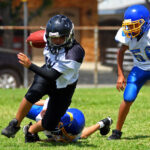Shattered minds: Study reveals alarming link between adolescent concussions, poor mental health, and suicidal behaviors
 (NaturalHealth365) If you participated in sports during your younger years, there’s a possibility you experienced a concussion without realizing it. Even a collision with a fellow outfielder while chasing a pop fly has the potential to cause a concussion.
(NaturalHealth365) If you participated in sports during your younger years, there’s a possibility you experienced a concussion without realizing it. Even a collision with a fellow outfielder while chasing a pop fly has the potential to cause a concussion.
Not too long ago, youth athletes often dismissed dizziness after a head impact and swiftly returned to the game. While concussions weren’t regarded seriously before the 2000s, it’s evident they can significantly affect both mental and physical health. A recent study in the Journal of Athletic Training highlights a clear link between adolescent concussions and compromised mental health, including a risk of suicidal behavior.
The study that may change your view of youth concussions
Conducting an in-depth examination, the study analyzed extensive data obtained from 17,400 participants who actively contributed information to the National Youth Risk Behavior Surveillance System. This comprehensive analysis spanned the years 2017 to 2019. Spearheading this research initiative was Jacob Kay, a leading expert in the field.
The study’s findings went beyond merely reaffirming the well-established connection between brain injuries and mental health. In a groundbreaking revelation, the research uncovered subtle and nuanced distinctions in how individuals of different genders experience and cope with the impact of concussions during the critical formative years of their lives. This not only enhances our understanding of the broader correlation but sheds light on the specific dynamics at play based on gender.
The consequence of adolescent concussions is greater than anyone anticipated
The study linked above shows teens, especially male teens, face an increased risk of suicide following a concussion. Those with multiple concussions in the previous year were two times as likely to attempt suicide as other young boys.
The researchers determined boys are much more likely to consider or attempt suicide one year after suffering a concussion. The likelihood of a suicide attempt doubled for teen boys who reported multiple concussions in the previous year.
The findings above are even more concerning when juxtaposed with the findings pertaining to girls. The chances of a girl planning or attempting suicide were similar, even with different concussion histories. However, the research team noted they are unsure as to why there are differences in post-concussion responses between genders. Perhaps boys’ seemingly inherent impulsivity is the cause of the different responses to concussions.
Effective ways to minimize the risk of concussions
Engaging in sports for an extended period inevitably introduces situations where head contact becomes unavoidable. However, one way to mitigate the risk of concussions is by opting for non-contact sports like golf, tennis, pickleball, and swimming.
Prioritize the use of protective headgear, especially in contact sports, to reduce the likelihood of head injuries. If a blow to the head occurs, stop playing immediately. Additionally, if you experience symptoms such as dizziness, confusion, light sensitivity, or any signs of a concussion, it is a good idea to seek a medical evaluation.
Parents, be sure to regularly check your children’s helmets to ensure a proper fit, providing optimal protection. Also, keep an eye out for potential hazards when you’re on the move. Take the time to dig into the options and pick car and booster seats that match up with your child’s age and size.
Your effort in finding the right fit ensures your little one stays safe and snug during travel. This proactive approach ensures that, in the event of a collision, your child remains securely restrained, significantly minimizing the risk of a concussion.
Sources for this article include:



